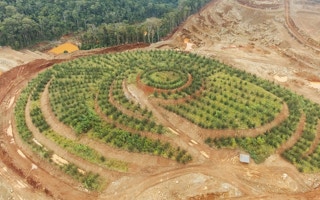Environmental groups are decrying plans by the government to tap mining as a means to ensure the sustainable recovery of the Philippine economy from pandemic disruptions.
Philippine president Ferdinand Marcos, Jr’s top economic manager Benjamin Diokno said in a statement last week that “the mining industry holds the greatest potential to be a key driver in our economic recovery and long-term growth especially now that world metal prices are high.”
Finance secretary Diokno made the remarks on 3 August during the listing of new common shares of Philex Mining Corporation, the country’s largest copper and gold producer. The firm raised US$37.16 million from the stock rights offering which will be used to pay for mine development, construction of a mill plant, and support facilities for its Silangan copper-gold mine project in Surigao del Norte.
To continue reading, just sign up – it’s free!
- Get the latest news, jobs, events and more with our Weekly Newsletter delivered to you free.
- Access the largest repository of news and views on sustainability topics.
- You can publish your jobs, events, press releases and research reports here too!
Newsletter subscribers do not necessarily have a website account. Please sign up for free to continue reading!
“
Environmental destruction [from mining] has lasting consequences that could easily wipe out the measly gains of short-term economic recovery.
Jaybee Garganera, national coordinator, Alyansa Tigil Mina
Concerned that the remarks are indicative of the Marcos government’s backing for mining, environmental groups are voicing their opposition.
“We are alarmed [by Diokno’s statement]… By considering mining as an essential industry that would spur economic growth, we are concerned that this government would ignore the negative impacts of mining for the sake of profit,” said Jaybee Garganera, national coordinator of Alyansa Tigil Mina, a coalition of anti-mining groups.
“We disagree that mining should be the key driver in the country’s economic recovery as environmental destruction has lasting consequences that could easily wipe out the measly gains of short-term economic recovery.”
A revival of the mining industry could only lead to displacement of communities, air and water pollution, loss of biodiversity, soil erosion, land use changes, and food insecurity. To boost the economy, the government must focus on alternatives like agroforestry, eco-tourism and watershed development, and community-based small-scale mining, said Garganera.
“The negative impacts of mining, particularly its environmental costs, far outweigh whatever contribution it could bring to the economy,” he said.
“Miniscule”: mining sector’s US$1.84 billion contribution to Philippine economy
The local mining sector accounted for US$1.84 billion, equivalent to 0.6 per cent of gross domestic product (GDP) growth in 2020, while mining and quarrying activities created 184,000 jobs, according to latest figures from the Mines and Geosciences Bureau (MGB).
But numbers of the mining industry’s long term performance in terms of providing revenue and employment are still “miniscule”, said Yolanda Esguerra, national coordinator, Philippine Misereor Partnership Inc. (PMPI), a social development network whose advocacy work includes opposing mining in the Philippines.
“Mining as a driver to economic recovery is still a myth,” Esguerra told Eco-Business. “This is especially when compared to the destruction and violations of rights of people and nature that they bring to many mining affected communities.”
“
Mining as a driver to economic recovery is still a myth.
Yolanda Esguerra, national coordinator, Philippine Misereor Partnership Inc.
The MGB also reported that a total of US$450.70 million was committed to the social development management programme (SDMP) fund, which is used to improve the living conditions of the host and nearby communities in mining areas.
Esguerra said this falls short of the real obligations that mining companies have to the local communities. The companies should be giving back 1.5 per cent of their annual gross operational expenses through the SDMP, she said.
“It is a requirement that they have to fulfill and should be treated as their payment for their debts to the people and environment. What they have given or promised is again nothing compared to what they have already greedily taken in sales and profit, for the many years of destroying the environment,” she said.
Marcos’ predecessor, Rodrigo Duterte, openly criticised the mining industry for the environmental degradation it has caused when he assumed office in 2016. He imposed a ban on open-pit mining in 2017 and appointed Gina Lopez, a staunch anti-mining advocate, as environment and natural resources secretary.
But last year, Duterte reversed his own order and lifted a nine-year moratorium on granting new mining permits for copper, gold, silver and complex ores in the country, a few months before stepping down from office.
Marcos and his economic team, composed of officials who also served under Duterte, are continuing the past administration’s switch to mining.

















